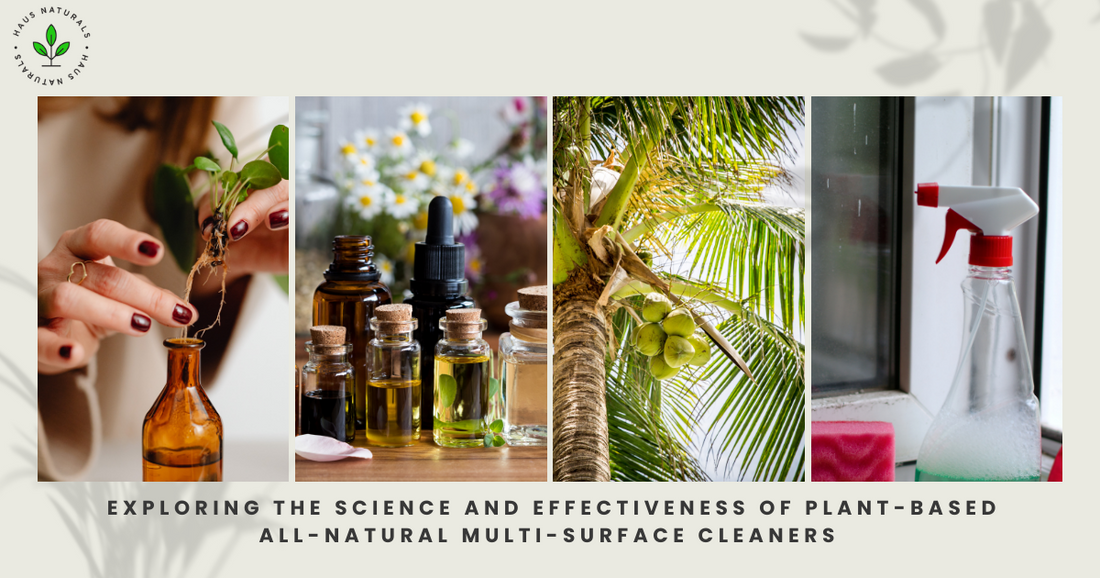Recently, there has been a growing interest in plant-based, all-natural cleaning products. As a result, many consumers are becoming more conscious of the potential health and environmental risks associated with traditional chemical-based cleaners. In this blog, we will dive into the science behind these cleaners, exploring how they work and discussing their effectiveness in maintaining clean and healthy environments.
Understanding Plant-Based Multi-Surface Cleaners:
The all-natural multi-surface cleaners are formulated using ingredients derived from renewable plant sources such as fruits, vegetables, and herbs. These cleaners are typically free from synthetic chemicals, petroleum-based solvents, and artificial fragrances. Instead, they rely on the natural properties of plant extracts and essential oils to clean various surfaces.
Knowing the key Ingredients and their Cleaning Abilities:
- Plant Extracts:
Plant extracts, such as citrus or vinegar, contain natural acids that act as effective solvents and degreasers. These acids can break down dirt, grime, and stains on various surfaces, including countertops, floors, and glass.
- Essential Oils:
Essential oils, such as tea tree oil or lavender oil, have antimicrobial properties that can help eliminate bacteria, fungi, and viruses. They also add a pleasant fragrance to the cleaners without relying on artificial perfumes.
- Surfactants:
Plant-derived surfactants, such as those made from coconut or corn, are used to reduce surface tension and increase the spreadability of the cleaner. This allows the cleaner to effectively lift dirt and oil from surfaces.
Mechanism of Action:
When you spray a plant-based all-natural multi-surface cleaner on a dirty surface, several processes occur to facilitate effective cleaning.
- Solubilization: The natural acids present in plant extracts help dissolve dirt, oils, and grime, making them easier to wipe away.
- Emulsification: Surfactants in the cleaner surround and trap oily substances, suspending them in the cleaning solution. This allows the cleaner to effectively remove grease from surfaces.
- Disinfection: Essential oils with antimicrobial properties target and disrupt the cell membranes of bacteria, fungi, and viruses, leading to their elimination.
Environmental Benefits:
One of the significant advantages of plant-based multi-surface cleaners is their positive impact on the environment. They are typically biodegradable, meaning they break down naturally without leaving harmful residues or contributing to pollution. These cleaners also have a reduced carbon footprint compared to their chemical-based counterparts, as they rely on renewable resources rather than non-renewable fossil fuels.
Effectiveness:
These cleaners have been proven to be effective in various cleaning tasks. However, it's important to note that their effectiveness can vary depending on the specific formulation and the type of surface or stain being cleaned. While these cleaners can handle everyday dirt and grime effectively, they may struggle with heavy grease or certain stubborn stains. It is advisable to read product labels and follow manufacturer instructions for optimal results.
In conclusion, plant-based all-natural multi-surface cleaners offer a safer and more environmentally friendly alternative to traditional chemical-based cleaners. By harnessing the power of natural ingredients, such as plant extracts and essential oils, these cleaners effectively clean and disinfect surfaces while minimising potential health risks and environmental harm. While they may not be suitable for all cleaning tasks, they are an excellent choice for maintaining clean and healthy living spaces. Reduce your carbon footprint and live a healthier lifestyle with an all-natural and plant-based cleaning product. Make the switch now to Haus Naturals plant-based cleaning products.

